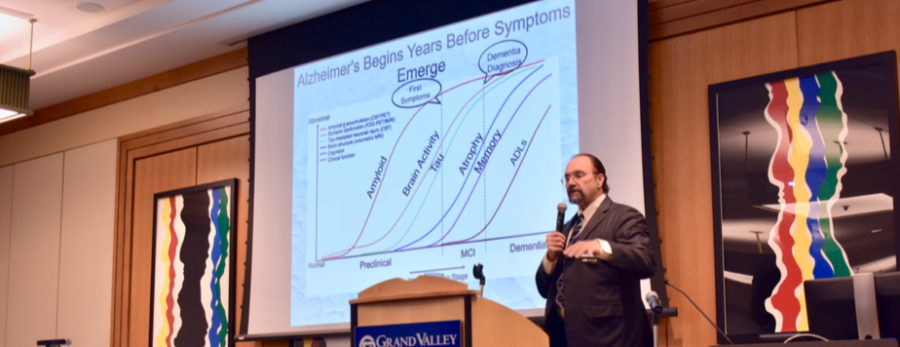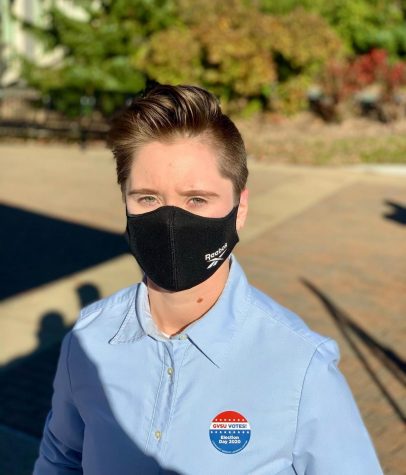Collaborative lecture series discusses Alzheimer’s disease, dementia
Nov 19, 2018
“In most cases, it’s family members who will notice certain changes in a loved one’s personality, and these changes can be among the major indicators of early dementia or Alzheimer’s.”
This finding was just one of many discussed by Spectrum Health Neurologist and Michigan State Professor Cynthia Hingtgen during the health lecture “Alzheimer’s Disease: A Look into the Future” on Nov. 12 in the L. William Seidman Center on Grand Valley State University’s downtown Pew Campus.
The event was a part of the “Your Health Lecture Series,” an annual collaboration between GVSU, Spectrum Health and Michigan State University’s College of Human Medicine. This year’s lecture series was focused on educating students and the Grand Rapids community about disorders of the brain, such as Alzheimer’s disease and autism.
The first in the series, the lecture centered around the latest research on Alzheimer’s disease and the impact it has on patients, caregivers and the healthcare system. The hour-long event also featured presentations from GVSU’s Kirkhof College of Nursing Professor Rebecca Davis and MSU’s College of Human Medicine Professor David Morgan. The presentation was attended by current and past college students, as well members of the community both young and old, who wanted to learn more about new research findings and treatment options for Alzheimer’s disease.
Hingtgens’s lecture highlighted new findings on Alzheimer’s regarding the symptoms, evaluation, diagnoses and possible emerging treatments for Alzheimer’s dementia. Hingtgen participated in the talk because she views herself as an educator foremost and believes in the importance of inter-college collaboration within medical education.
“The different colleges and universities in a community are where we are going to get future physicians,” Hingtgen said. “The more we interact with students, the more we can help ensure that there will be more quality neurologists that will want to stay in Grand Rapids and aid people in our community living with dementia-related diseases.”
Davis’s presentation discussed the impact of Alzheimer’s disease on the caregivers and patients, as well as further resources to aid both the patient and the caregiver. Davis stressed the importance of being a knowledgeable caregiver if you are a loved one of someone with Alzheimer’s disease, and emphasized knowing what resources are available to caregivers.
Following the presentations, the presenters took time to answer questions from attendees, and many of the questions came from family members and caregivers of Alzheimer’s disease patients in the Grand Rapids community.
“Getting the chance to answer community questions about Alzheimer’s is incredibly important,” Davis said. “The number one takeaway I wanted people to have after attending this event was how urgent it is that we begin figuring out how to diagnose Alzheimer’s earlier and get patients help earlier.”
Davis also said she knows the importance of collaboration between healthcare providers when presenting in these events, as many of her students in the College of Nursing work with Spectrum Health in Grand Rapids throughout their four years of college.
“We have relationships with nearly all of the healthcare providers in Grand Rapids, and we always try to work with them when putting on events like these to maintain those relationships and to help students make new connections with healthcare professionals,” Davis said.
Representatives from the Area Agency on Aging of Western Michigan University, Spectrum Health Neurosciences and the Alzheimer’s Association Greater Michigan Chapter were available prior to the lecture to provide additional information. The booths provided an opportunity to learn more from the people representing these organizations as well as valuable written information for attendees to take with them after they visited each one.
There were many GVSU students in attendance including freshman Brooke Clarke, who came to GVSU to major in nursing. Clarke said she appreciates that GVSU puts on events catered to medical majors, and has seen the impact they have on students both within the medical majors and outside of them.
“These events help students who may want to go into certain fields discover different possibilities for the future within their majors.” Clark said, “I think they also gives students great opportunities to learn about different topics they may not have known about or explored from experts with experience.”



























